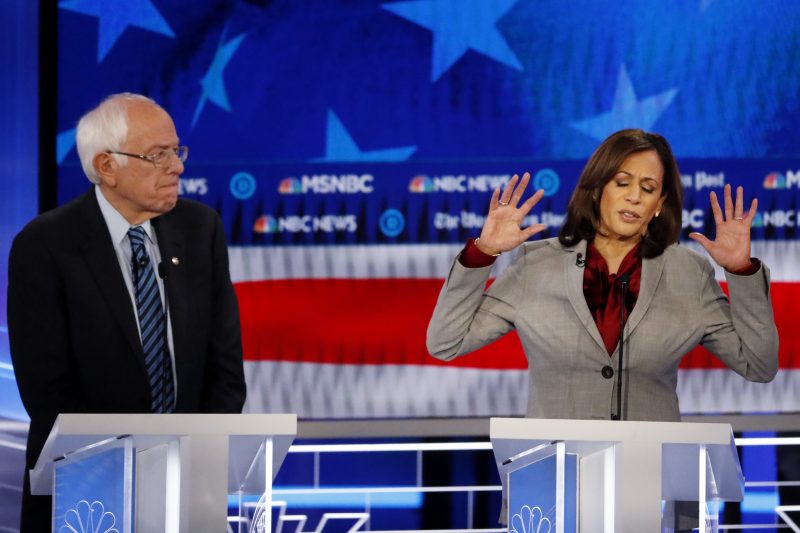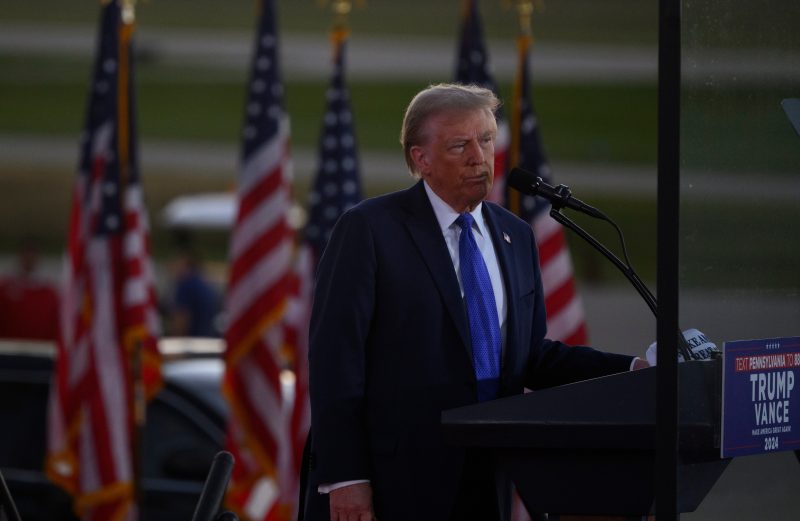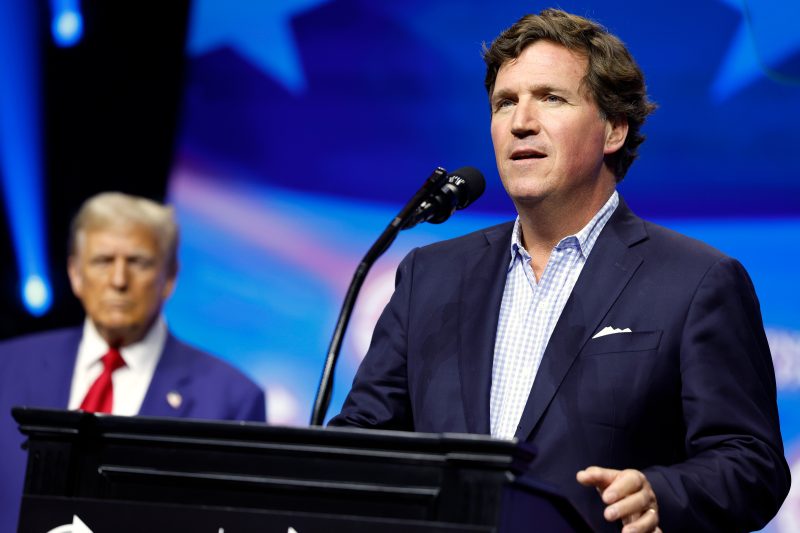
As Harris shifts to the center, progressives hold their fire — for now
Donald Trump describes Kamala Harris as the most “radical left” person to run for president, a “Comrade Kamala” who wants to raise taxes to fund a liberal agenda.
But the most progressive members of Congress — many of whom served alongside Harris when she was in the Senate — paint a very different picture of the vice president.
While they saw Harris as an ally on reproductive rights and voting rights, many liberals have far deeper relationships with President Joe Biden and his team after he embraced the left wing to push his legislative agenda. They fear that under Harris they would lose the unique access they had to the West Wing and are pushing the Democratic nominee to embrace more populist economic policies in the closing weeks of her campaign, noting that parts of her platform are less progressive than Biden’s in 2020.
“She does her thing and had her portfolio. Most of my efforts have been with President Biden,” Sen. Bernie Sanders (I-Vt.) said when asked in an interview on what issues he saw the vice president as an ally.
As she runs the shortest presidential campaign in modern U.S. history, Harris has both backed off some of her earlier liberal positions and embraced some centrist ones, notably on immigration, fracking and parts of her economic agenda.
Despite that pivot, many progressive activists and lawmakers have held their fire and rallied behind her candidacy, seeing Donald Trump as the greater threat and hoping a united front will help defeat him. Sanders and Rep. Alexandria Ocasio-Cortez (D-N.Y.), another key progressive leader, had prominent speaking roles at the Democratic National Convention and are campaigning for Harris in swing states.
But in interviews, several progressive lawmakers and staffers said they felt a stronger connection to Biden than to Harris, who has not worked as closely with them as vice president. They noted, too, that unlike Biden, Harris did not need to reach out to progressives to unify the Democratic Party after a bruising primary, instead focusing on appealing to voters beyond the Democratic base to win a general election. And some said they worry that she may not appoint a progressive as her chief of staff if she is elected.
The result could be a fissure with the party’s activist and progressive wing, potentially affecting her ability to govern.
“I think lots of people are holding their nose because they’re, like, whatever it takes to get you to win,” said one Democratic strategist who works closely with congressional progressives. “I have no doubt they’ll duke it out after the election.”
In a recent speech that appeared aimed at Pennsylvania swing voters, Harris’s move to the center was clear. She stressed she is a “capitalist” who wants “pragmatic” solutions to economic problems, such as a $25,000 tax credit for first-time home buyers, investments in manufacturing jobs and the reinstatement of the pandemic-era child tax credit. The rollout did not contain any items that are on liberals’ wish list, such a Medicare and Social Security expansion or a commitment to a $15 minimum wage.
And in a tough immigration speech last week, Harris renewed her calls for border security legislation and vowed to extend new asylum restrictions that have slashed the number of border crossings. That is a far cry from her 2020 presidential campaign, in which she called for decriminalizing border crossings.
“Her opponent is trying hard to paint her as a far-left San Francisco liberal,” said Sen. Chris Coons (D-Del.), a moderate who worked closely with Harris in the Senate. “I think that’s a caricature.”
A Harris campaign spokeswoman declined to comment for this article.
Sanders, a standard-bearer of today’s progressive movement, called Harris smart and tough and said he is doing “everything he can do” to get her elected. But he has not developed the same bond with Harris as with Biden, which dates to the two serving in the Senate together.
After Sanders dropped out of the 2020 presidential primary, he worked closely with Biden’s campaign to form “unity” task forces outlining a shared agenda that delighted liberals. Congressional progressives then worked closely with Biden and his team to pass much of that legislative wish list, including a sweeping climate change bill that also lowered prescription drug costs.
Sanders and Harris haven’t spoken one-on-one since her initial round of outreach to Capitol Hill shortly after Biden stepped aside from the race, according to two people with knowledge of the interactions.
Biden and Sanders’s odd-fellow alliance set the tone for a warm relationship between the president and congressional Democrats’ left flank, which enjoyed unparalleled access to his top staff.
“A lot of the progressive caucus worked very closely with President Biden’s team — that’s why many of us were very loyal to him to the last day,” said Rep. Ro Khanna (D-Calif.).
Several progressive operatives and lawmakers noted that a compressed campaign timeline and the lack of a primary process precluded Harris from hammering out a shared agenda.
“I do believe and hope and expect that [Harris] understands how important progressives were to the Biden administration’s victories,” said Rep. Pramila Jayapal (D-Wash.), who chairs the House Progressive Caucus. “I hope she sees how valuable that partnership and that work together was.”
At first glance, Harris would seem a natural progressive ally. She joined the Senate in 2017 and soon after ran for president, backing liberal policies such as granting undocumented immigrants access to lawyers, decriminalizing crossing the border without authorization and banning fracking. One nonpartisan ranking of Harris’s voting and legislative record in the Senate from 2019 to 2021 pegged her as the second-most liberal senator, after Sanders. (The senator from Vermont, who describes himself as a democratic socialist, rejected that characterization, however, and has said Harris and he differ ideologically.)
As vice president, Harris worked on expanding the child tax credit in a pandemic-era economic relief bill. She has also championed abortion and voting rights — two issues on which she has at times struck a more liberal posture than Biden. In 2022, Harris pushed Biden to back a carve-out to the 60-vote Senate filibuster rule to protect voting rights, and she recently called for doing the same to pass a law codifying Roe v. Wade.
Progressives have largely held back criticism as Harris has touted endorsements from former Republican vice president Dick Cheney and his daughter Liz; embraced a tough Senate bill on the border that would significantly increase enforcement without providing additional pathways to citizenship; and mostly sided with the administration’s existing policy on Israel as it wages war in Gaza and Lebanon.
But some liberals have suggested that Harris release bolder economic policy proposals to reach voters who are concerned about economic security, arguing that doing so is key to victory.
“I think the contrast should be clear that Democrats not only don’t want to cut Social Security, we want to expand Social Security,” said Sanders, who encouraged Harris to campaign on lifting the Social Security taxable income cap to increase benefits, which is not part of her platform. He also is urging her — so far, unsuccessfully — to make expanding Medicare coverage to include dental and vision and raising the federal minimum wage to $17 an hour a part of her pitch.
“I think that expanding health care is crucially important, and it’s something that I personally would love to see more,” said Ocasio-Cortez, adding that she has had multiple conversations with Harris since Biden dropped out.
The congresswoman argued that staking out clearer, more progressive positions is key to turning out younger voters — a group some polls suggest Harris is underperforming among compared with Biden four years ago.
“We’re not going to win constituencies and really turn out the vote with pop culture alone — these are constituencies that are highly motivated on substantive issues,” Ocasio-Cortez added.
As vice president, Harris has been most closely aligned with the New Democrat Coalition, the largest Democratic caucus in the House, according to Rep. Ann Kuster (D-N.H.), who chairs the moderate faction. The group has been providing policy papers to Harris’s team that have become the basis for her economic agenda.
Kuster argued that ideological discrepancies among House Democrats have shrunk over the past four years — especially in the face of a potential Trump presidency.
“Our caucus is more unified than it has been since I’ve been here — 12 years — and part of that is because on the big issues, we totally agree,” Kuster said.
Privately, some Democrats are anxious about whom Harris might appoint as her chief of staff, given that the pick would signal how much she intends to bring liberals to the table. Several mentioned as an ally longtime Harris adviser Rohini Kosoglu, who while working for Harris played a role in negotiating the expanded child tax credit in 2021. And some are warily eyeing Harris’s brother-in-law, Tony West, who recently took an unpaid leave from his job as Uber’s top lawyer to advise her campaign and is seen as close to the business community.
Liberals fondly remember their partnership with former Biden chief of staff Ron Klain and hope Harris will use him as a model.
“I do believe it is important who she surrounds herself with,” said Jayapal, who regularly received phone calls from the president praising her TV hits. “It is important that she has a team as the president did and a chief of staff as the president did that really values progressives as part of the coalition.”
Yet, on immigration and the war in Gaza, in particular, members to the left of Harris’s stances are avoiding harsh critiques as she faces Trump, hoping to hash out their differences after the election.
Rep. Ilhan Omar (D-Minn.), an outspoken critic of Israel’s actions in Gaza, said her “only hiccup” with Harris’s agenda is on foreign policy. But she’s encouraged by Harris’s Senate record, when she supported bills put out by the Progressive Caucus.
“It’s about us organizing and seeing how far we can push her once she wins the presidency,” Omar said.



